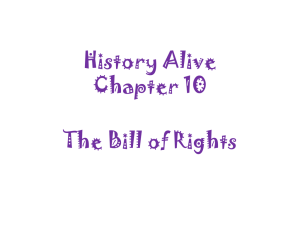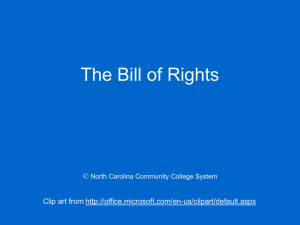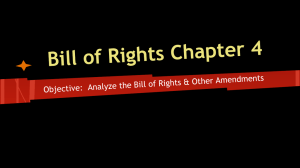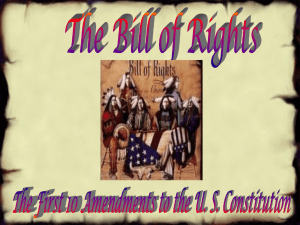Unit 2 Study Guide
advertisement
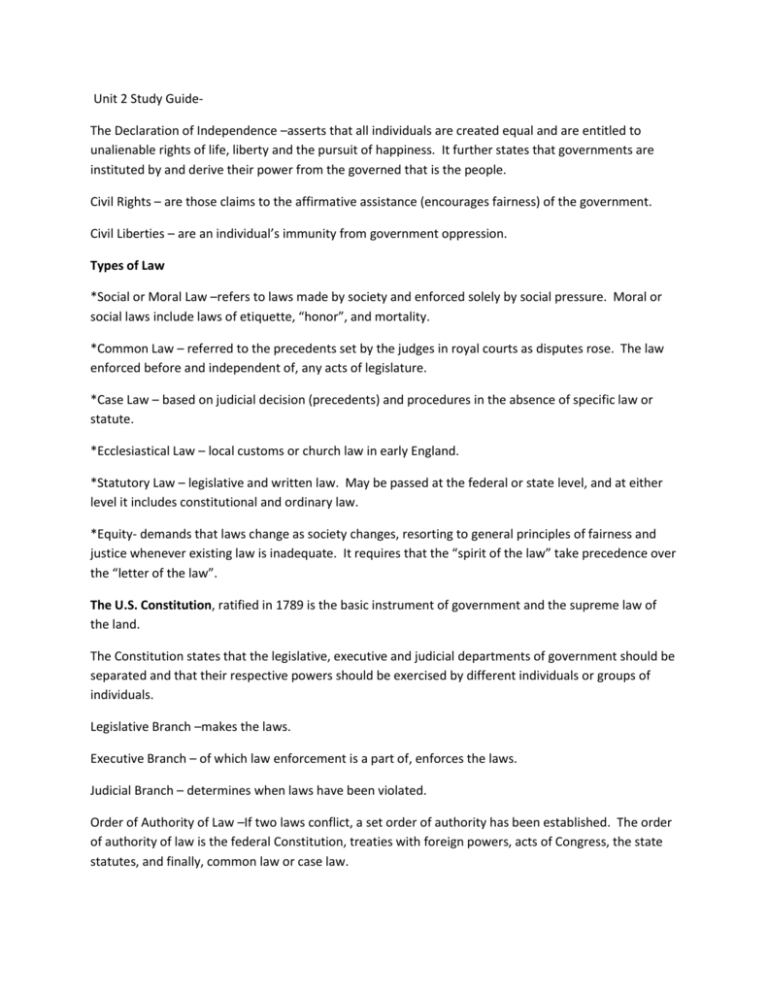
Unit 2 Study GuideThe Declaration of Independence –asserts that all individuals are created equal and are entitled to unalienable rights of life, liberty and the pursuit of happiness. It further states that governments are instituted by and derive their power from the governed that is the people. Civil Rights – are those claims to the affirmative assistance (encourages fairness) of the government. Civil Liberties – are an individual’s immunity from government oppression. Types of Law *Social or Moral Law –refers to laws made by society and enforced solely by social pressure. Moral or social laws include laws of etiquette, “honor”, and mortality. *Common Law – referred to the precedents set by the judges in royal courts as disputes rose. The law enforced before and independent of, any acts of legislature. *Case Law – based on judicial decision (precedents) and procedures in the absence of specific law or statute. *Ecclesiastical Law – local customs or church law in early England. *Statutory Law – legislative and written law. May be passed at the federal or state level, and at either level it includes constitutional and ordinary law. *Equity- demands that laws change as society changes, resorting to general principles of fairness and justice whenever existing law is inadequate. It requires that the “spirit of the law” take precedence over the “letter of the law”. The U.S. Constitution, ratified in 1789 is the basic instrument of government and the supreme law of the land. The Constitution states that the legislative, executive and judicial departments of government should be separated and that their respective powers should be exercised by different individuals or groups of individuals. Legislative Branch –makes the laws. Executive Branch – of which law enforcement is a part of, enforces the laws. Judicial Branch – determines when laws have been violated. Order of Authority of Law –If two laws conflict, a set order of authority has been established. The order of authority of law is the federal Constitution, treaties with foreign powers, acts of Congress, the state statutes, and finally, common law or case law. Bill of Rights – a fundamental document protecting a person’s right to “life, liberty, and the pursuit of happiness.” It refers to the first 10 amendments to the Constitution, which protect the people’s liberties and forbid the government to violate these rights. Special importance to criminal justice professionals are the First, Second, Fourth, Fifth, Sixth, Eighth and Fourteenth Amendments. First Amendment – Freedom of Religion – separates church and state and requires that the government be neutral on religious matters. Freedom of Speech – The Supreme Court has ruled that the first amendment does not protect all forms of expression. Schenck v. United States - establishes “clear and present danger” doctrine and serves as a guide to the constitutionality of govt. restrictions on free speech (and free press) Chaplinsky v. New Hampshire – established that the use of fighting words likely to cause violence will not be tolerated. Freedom of the Press- guarantees the right to express oneself by writing or publishing one’s views. Freedom of Peaceable Assembly – Americans have the right to assemble peaceably for any political, religious or social activity. Freedom of Petition – the right of petition is designed to allow citizens to communicate with their government without obstruction. Second Amendment –guaranties’ the right to keep and bear arms as necessary for a well-regulated militia. United States v. Cruickshank – challenged the constitutionality of a gun control statute. The court said that the 2nd Amendment only protected only the rights of the States. Printz v. United States – that the federal government is not empowered to require state or local law enforcement agencies to run background checks on perspective gun buyers. Third Amendment – No soldier in time of piece be quartered in a private house, without the consent of the owner, Nor during war time except in a manner prescribed by law. Fourth Amendment –requires probable cause and forbids unreasonable searches and seizures. Terry v. Ohio – Supreme Court ruled that the fourth amendment does not prohibit police officers from stopping and frisking a “suspicious person” if it was reasonable on the basis of the Police Officers experience and the demeanor of the individual frisked. In most instances a police officer is not allowed to search the homes of private citizens, seize any of their property or arrest them without first obtaining a court order (Warrant.) Chimel v. California – evidence in plain view may also be seized. Katz v. United States – established that evidence of conversations over heard through electronic surveillance was inadmissible because the proper authorization had not been obtained. Berger v. New York – established that although electronic eavesdropping was prohibited by the fourth amendment, under specific conditions and circumstances it could be permitted. Exclusionary Rule –the courts must refuse to consider evidence obtained by unreasonable search and seizure methods, regardless of how relevant the evidence is to the case. Weeks v. United States – Exclusionary rule is the direct result of this case when the Court considered evidence seized unconstitutionally. This case made it applicable to federal cases. Mapp v. Ohio – made the Exclusionary Rule applicable to every court in the country. Fifth Amendment – guarantees due process (substantive and procedural)- notice of hearing, full information regarding the charges, the opportunity to present evidence in one’s own behalf before an impartial judge or jury and to be presumed innocent until proven guilty by legally obtained evidence. Prohibits - double Jeopardy and Self-incrimination. Grand Jury – before individuals are tried in federal court for and infamous crime they must be indicted, that is, formally accused by a grand jury. The Grand Jury must assure that there is probable cause to believe a person is guilty of a crime. Probable Cause – the level of evidence held by a rational and objective observer necessary to justify logically accusing a specific suspect of a particular crime based upon reliable objective facts. Subpoena – legal document that orders into court as witnesses whose testimony is desired by trial. Hearsay evidence – second hand evidence, cannot be used in criminal trials except in certain instances. Due Process of law – a due process clause occurs in the 5th and 14th Amendment as a restraint on federal and state governments. Substantive Due Process – protects against arbitrary, unfair procedures in judicial or administrative proceedings that could affect a citizens personal and property rights. Procedural Due Process - deals with notices, hearings, and gathering of evidence. Brady v. Maryland – held that the suppression of evidence favorable to an accused by the prosecution violates due process. United States v. Russell – found that it was not entrapment for an undercover agent to have supplied the defendant with scarce ingredient required to manufacture and illicit drug. Hampton v. United States – the Court held that it was not entrapment for undercover agents to be both providers and purchasers of drugs involved in the case. Double Jeopardy – citizens will not be tried before a federal or state court more than once for the same crime. (A second trial can occur, however, when the first trial results in a mistrial or when a second trial is ordered by the appellate court.) United States v Ursery – law enforcement can constitutionally use asset forfeiture without double jeopardy concerns. Self-incrimination – any person has a right not to be a witness against him or herself. Miranda v. Arizona – citizens must be warned prior to custodial interrogations of their right to remain silent, that what they say may be used against them in court and that they have right to counsel, which will be furnished to them. If these warnings are not given , any statements obtained by the questioning are inadmissible in later criminal proceedings. New York v Quarles – established an exception to the Exclusionary Rule in that if the public safety would be threatened by delaying questioning, police may question a subject in custody without first advising of the right not to self –incriminate. Six Amendment- Establishes requirements for criminal trials: *A speedy public trial by an impartial jury of one’s peers *Be informed of the nature and cause of the accusation *Be confronted with and able to cross-examine witnesses against one’s self *Subpoena witnesses in one’s defense *Be represented by legal counsel Gideon v Wainwright-states must provide free legal counsel to indigent defendants in all felony cases. Eighth Amendment – forbids excessive bail, excessive fines, and cruel and unusual punishment. Stack v. Boyle –determined the right of release before trial is conditioned upon the accused giving adequate assurance that he will stand trial and submit to sentence if found guilty…Bail set higher than an amount reasonably calculated to fulfill this purpose is “excessive” under the Eighth Amendment. Cruel and Unusual Punishment-Whether fines or confinements are cruel and unusual must be determined by the facts of each particular case. The Supreme Court has heard numerous cases concerning cruel and unusual punishment. Furman v. Georgia (1972) – stated that the death penalty violated the Eighth Amendment if the sentencing authority has the freedom to decide between the death penalty and a lesser penalty. Gregg v. Georgia (1976) - held that the death penalty for murders is not per se cruel and unusual punishment. Rummel v. Estelle (1980)- ruled that a mandatory life sentence required by a state habitual offender statute is not cruel and unusual punishment. Ninth Amendment- emphasizes the Founding Fathers view that government powers are limited by the rights of the people. Rights that may have been overlooked (not specifically mentioned) by the Constitution are still the rights of the people. Tenth Amendment –embodies the principle of federalism. The States maintain the residue of power that is not granted to the federal government or withheld from the States specifically. Fourteenth Amendment – limits the states infringement upon individual rights. It requires each state to abide by the Constitution and the incorporation doctrine of the Bill of Rights. It guarantees due process and equal protection under the law. Equal Protection – a state cannot make unreasonable, arbitrary distinctions between different people’s rights and privileges. “All people are created equal.” *Criminal Law –defines crimes and fixes punishments for them. Substantial Criminal Law – the statutes that define what acts constitute social harm. It not only defines the offense but also states the punishment. Felony–is a serious crime, generally punishable by death or by imprisonment for more than one year in a state prison or penitentiary. Misdemeanor- is any minor offense, generally punishable by a fine or a short term, usually not to exceed on year in a jail or work house. In MN a misdemeanor means a crime for which a sentence of not more than 90 days or a fine of not more than $1,000, or both, may be imposed. Ordinance – County and city is given the right to pass laws for local jurisdiction, providing the law does not conflict with the States laws. Ordinances are primarily community related. Mala in se – means bad in itself Mala prohibita – means bad because it is forbidden Mala in se –crime is one so offensive that it is obviously criminal (for example rape or murder) Procedural Criminal Law – specifies what must be proven and how. To prove that a crime has been committed, it is usually necessary to prove the material elements of the crime and the criminal mental state. Actus reus –The guilty act Mens rea – intent to do wrong - “the guilty mind” Corpus delecti – the body of the crime itself - The distinctive elements that must exist for a particular crime to be proven Criminal Intent – to convict someone of a crime it must be proven that the defendant intentionally, knowingly, or willingly commitment the criminal act. Strict liability – crimes where intent is not an element. These crimes generally involve traffic violations, liquor violations, and hunting violations. Motive – the reason for doing something. Scienter –guilty knowledge making individuals legally responsible for their acts. The person committing the act knew that it was a crime. *Civil Law – noncriminal restrictions placed on individuals. It seeks not punishment but restitution. Tort – Civil offense. Private wrong, Individual prosecutes, seeks readdress for injury, Intent not necessary. Litigaphobia – means “lawsuit paranoia” Crime – all behavior and acts for which a society provides formally sanctioned punishment. Public wrong, state prosecutes, seeks to punish, criminal intent is required. An Act can be both a crime and a tort. Section 1983 of the U.S. Code, Title 42 stipulates that anyone acting under the authority of local or state law who violates another person’s constitutional rights –even – though they are upholding the law – can be sued. Negligence – the failure to use due care to prevent foreseeable injury. Police Power – derived from the U.S. Constitution, U.S. Supreme Court decisions, federal statutes, state constitutions, state statutes, state court decisions, and various municipal charters and ordinances. Police Power is restricted by the Constitution, the Fourteenth Amendment, and the courts. Authority – the right to direct and command. Power – the force by which others can be made to obey. Scales of Justice – symbolize the desire to balance the needs of society with individual rights. Conflict Theory – contends that certain behaviors are criminalized to keep the dominant class in power Consensus Theory – individuals within a society agree on basic values, on what is inherently right and wrong.


